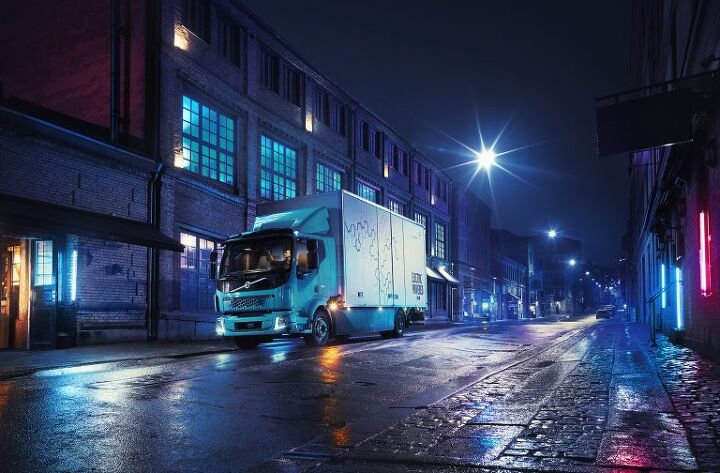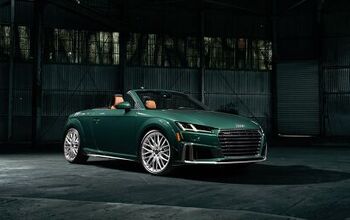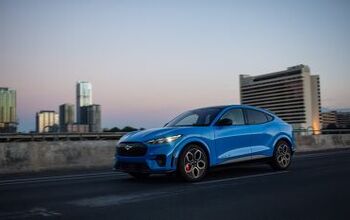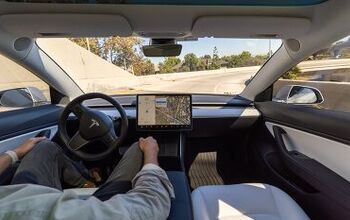European Truck Manufacturers Ending ICE Production in 2040

An alliance of European truck manufacturers have pledged to stop selling vehicles that produce any emissions by 2040 — pushing up its previous target date by a full decade.
The group, which includes Daimler, Scania, Man, Volvo, Daf, Iveco, and Ford, have all signed a pledge to focus on developing hydrogen and battery technologies so that petroleum-derived propulsion can be phased out of the trucking industry.
It’s one reason you see such extreme environmental measures receive hard targets that are never met and immediately recycled once the industry is sure everyone’s forgotten. Part of this is our fault, too. We’ve gotten wise to the empty promises the automotive sector seems contractually obligated to make and simply shrug our shoulders whenever we hear corporate commitments.
But now the industry actually sees an opportunity to profit off EVs by digitizing the automobile and leveraging the increased amount of control that brings. Once cars are electric, automakers can more easily control the data they produce, adopt new subscription models for features, and even build their own proprietary charging networks. That, in addition to massive financial investments into firms pushing new technologies, have made electrification look far more appetizing to the industry — especially since the alternative is often a sizable fine for not complying with ever-expanding emission regulations.
Europe’s truck-producing manufacturers are acting under the European Automobile Manufacturers Association (ACEA) and are reportedly working with the Potsdam Institute for Climate Impact Research to decide which programs should be funded. The industry will spend about €50-100 billion on new technologies, Scania chief executive Henrik Henriksson told the Financial Times ahead of the pledge announcement.
From FT:
The pledge signed by the chief executives of the [semi] truck and van businesses also calls for widespread investment in energy grids and a higher tax on carbon across Europe to help drive the change.
“If we can make this happen, we need to work all together,” said Mr Henriksson, who chairs ACEA’s commercial vehicle board.
The pledge comes as European regulators and governments seek to phase out emissions from road transport.
The EU plans to reduce CO2 emissions by 50 per cent by the end of the decade.
The UK has said it will end the sale of new petrol and diesel cars including hybrids by 2035, and will consult on trying to end the use of diesel [trucks].
“[Freight deliveries are] the backbone of any society in the world today, but we have to recognise that they are very dependent on the internal combustion engines to transport all the goods of every industry,” said Professor Johan Rockström, director of the Potsdam Institute.
[Image: Volvo Trucks]

A staunch consumer advocate tracking industry trends and regulation. Before joining TTAC, Matt spent a decade working for marketing and research firms based in NYC. Clients included several of the world’s largest automakers, global tire brands, and aftermarket part suppliers. Dissatisfied with the corporate world and resentful of having to wear suits everyday, he pivoted to writing about cars. Since then, that man has become an ardent supporter of the right-to-repair movement, been interviewed on the auto industry by national radio broadcasts, driven more rental cars than anyone ever should, participated in amateur rallying events, and received the requisite minimum training as sanctioned by the SCCA. Handy with a wrench, Matt grew up surrounded by Detroit auto workers and managed to get a pizza delivery job before he was legally eligible. He later found himself driving box trucks through Manhattan, guaranteeing future sympathy for actual truckers. He continues to conduct research pertaining to the automotive sector as an independent contractor and has since moved back to his native Michigan, closer to where the cars are born. A contrarian, Matt claims to prefer understeer — stating that front and all-wheel drive vehicles cater best to his driving style.
More by Matt Posky
Latest Car Reviews
Read moreLatest Product Reviews
Read moreRecent Comments
- VoGhost I know one commenter who would love to live in Kia towers.
- VoGhost Matt, do us all a favor, will you? Since you love the term 'EV mandate' so much, could you please point to a single country or state that has mandated that consumers buy an EV? At any point in time - historical or the future. Just one, Matt. Just a single place where the term 'EV mandate' is even close to being true.
- VoGhost Just so we all have this correct, you're saying that the red states that refuse to educate their children or fund healthcare for their citizens also want them to die earlier from fossil fuel pollution? OK. I see. Makes the decision in November a little more stark.
- Golden2husky The image that sustainable products are second-rate is a problem that the industry has to overcome. Best way to do that is to make sure your first effort is a home run right out of the box. Michelin is the type of company that can make it happen.
- VoGhost At some point, is TTAC going to explain how Tesla doesn't have MSRPs or dealers or dealer incentives? That there's no cash on the hood, subsidized leases or other games that legacy ICE automakers play with consumers? Or is it just easier and more profitable for TTAC to just continue to make an article of every price fluctuation?


































Comments
Join the conversation
Hydrogen, chemical batteries and solid state batteries share one characteristic. They are means of storing energy. If you have a wholesale switch, where will the extra energy required originate?
All these "pacts" and predictions are always made just far enough in the future (10-20 years) that people will completely forgot about them when they are not met or don't come true. It makes the companies feel virtuous and satisfies the gov regulators and enviro lobbyist but in 2040 we all know trucks will still be burning diesel